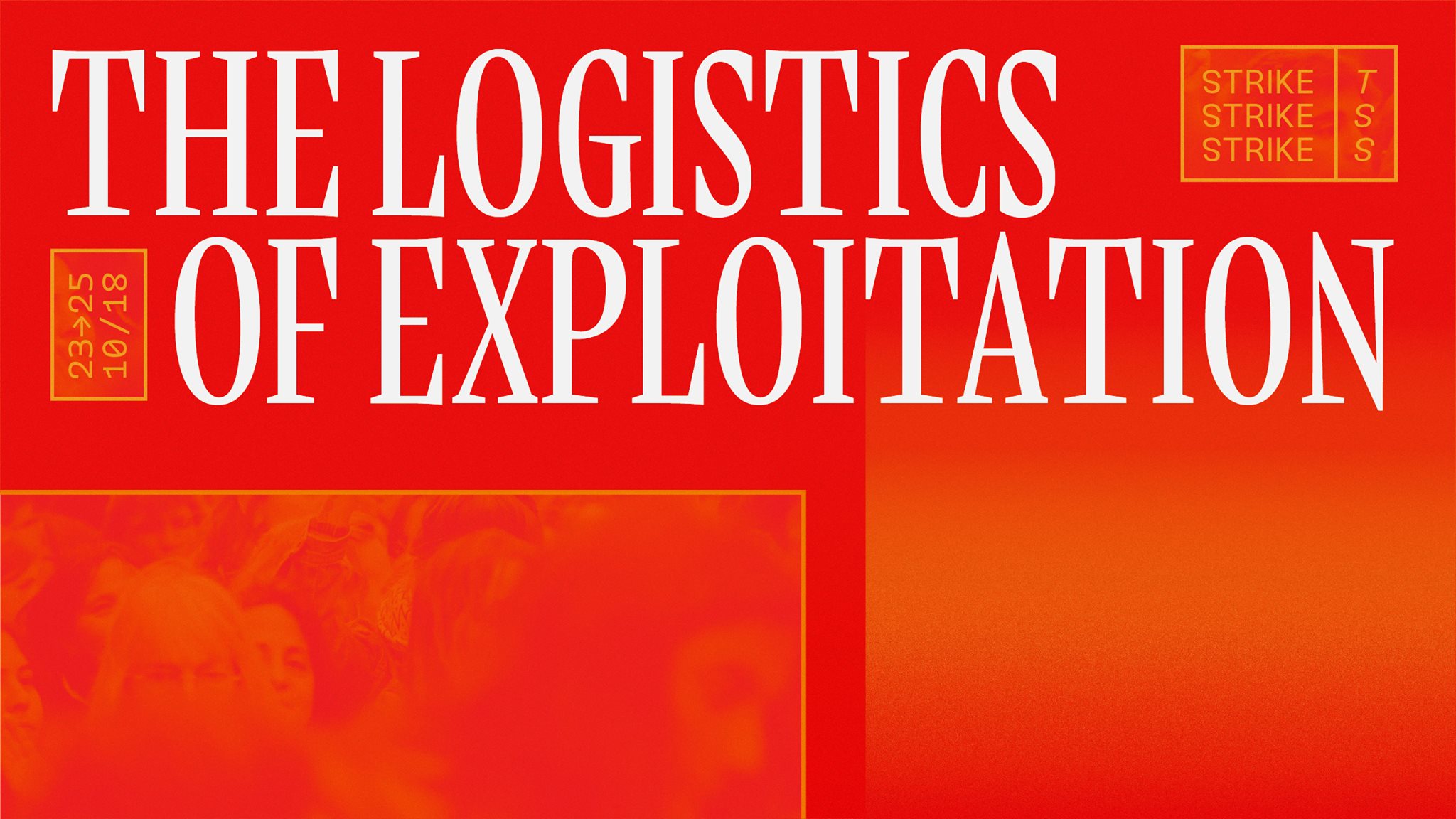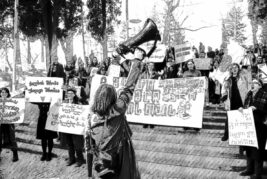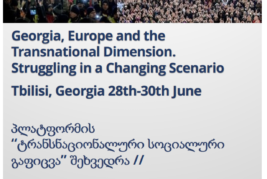
Day one: Friday, November 23
5 PM – 8 PM
Location: ABF (Katasalen)
Introduction:
Welcome and presentation of the Transnational Social Strike platform and the theme for the meeting: Against the Logistics of Exploitation.
Panel preface: Strike Back
As an introduction to the evening panel, we have invited Emil Boss from the SAC union and its local Stockholm branch. In Sweden, as we speak, business lobby, national administration and the leadership of a national union conglomerate, have formed an alliance to illegalize most forms of workplace conflict. The mobilization in response to this, however, is wide and growing. The Strike Back movement has managed to offer a reversal to the disconnection experienced over many decades, between numerous segments of the working class. Emil gives a brief outline of a new political confrontation concerning the working class as a whole, for generations to come.
Panel: The Politics of Strike
National laws that protect our right to strike are the outcome of workers of past generations fearlessly striking without legal protection. Protection has always lied in the very power of collective refusal itself — coupled of course with the function of strike funds, and the vital component of surrounding social support. This inherent power remains despite legal barriers. Looking at the current attempt to disable the strike in Sweden, we see that the political argument is that the very possibility to go on strike is a threat to the economy of the entire nation. At the same time, we see the rise of two parallel tendencies of resistance: new compositions of working class unity in defence of our rights, and an expanding use of strike that defies legality.
This opening panel will look at the politics of strike in the environment of a global production dependent upon intricate logistical considerations, absolute precarity and political control. In this environment, the smallest changes in one location affect the reality of every other. And perhaps for that very reason, new connections and opportunities for strike and working class power become available. The discussion starts from the perspective of people in struggle: the battle in the Gothenburg harbour, the Strike Back mobilization across Sweden, the struggles against the Loi Travail and Macron’s ordonnances in France, of Georgian transportation workers outside the European perimeter, and from the immense force of the Global Women’s Strike all around the world. The ambition of this panel is to challenge the isolation that is expected to keep us apart, draft ways to gain leverage by understanding connectivity across borders, and ways of forming resistance that slips through the cracks of legal barriers.
* The panel will end with an open discussion inviting all to confront and respond to the panel questions.
Entertainment: The syndicalist union choir
Nya Syndikalistiska Kören, or Nsynk, will do their own acapella arrangements of some classic Swedish and international class struggle songs.
Day two: Saturday, November 24
10 AM – 6 PM
Location: KTH – School of Architecture
This day is for those interested in dealing with a number of logistics-connected issues that require deeper collective investigation. The set-up is intended to encourage thinking and discussion. The aim is to potentially overcome some conflicting ideas and to find relevant ways to continue discussions, towards new collective goals.
MORNING WORKSHOP SESSION (10AM-1PM):
1. Logistics as the transnational command over labor.
This workshop will focus on the transformations driven by logistics in the labor process in terms of connection of different places and production sites with one another and intensification of work rhythms. This means that different conditions (geographical, contractual, political) are today in play in each workplace, and each workplace is connected with wider dynamics along the production chain. By addressing these questions, we want to discuss how logistical transformations have crippled the capacity to strike and harm profit. Within the situation created by logistics even the interruption of work if not included in wider transnational connections and a wider strategy risks to be just a temporary obstacle that can be circumvented or budgeted in advance. We therefore want to discuss what obstacles we face to build effective struggles; what it takes to build connections not only along the same productive chain, but across sectors that are touched by logistical transformations; how to overcome the specificities of local environments such as ports, warehouses, factories etc. to find common terrains of struggle.
Introductory inputs by Amazon workers from Poland, France and Spain, Modern Trade Union from Slovakia, Ertoba 2013 Metro Union and Solidarity Network from Georgia.
2. Precarity, mobility, migrant labor: fragmentation and challenges to logistics.
While stretching across the borders, logistical command also promotes a growing division between workers in the very same workplace, labor sector, country. Exploiting differences between native and migrant, precarious and contracted, logistics is just as much an arena for monitoring goods and parcels as it is for calculating the varied exploitation possibilities of workers. These processes of fragmentation relate to a more general transformation of labor and society and is rooted in specific political conditions (such as regulation of residence permits, of welfare benefits, border control and sexual hierarchies). No logistics can work without migrant and precarious labor. This poses us in front of two main questions: how to act in order for the conquests gained by some not to be paid by means of harsher conditions for others, migrant or precarious workers? And how to imagine forms of organization that are up to the high mobility of workers and flexibility of employment contracts and therefore not simply connected to one workplace or employer or category? Through a discussion on these elements we want to identify how these divisions are created and maintained, in order to collectively find ways to interfere with contemporary conditions of exploitation.
Introductory inputs by SAC Sweden, SiCobas Union Italy and Central European Organizing Center in Czech Republic.
LUNCH BREAK (1PM-3PM)
AFTERNOON SESSION (3PM-6PM):
III. Reports from the workshops
IV. Plenary Assembly: overcoming the deadlock of national and sectorial struggles
We may be in solidarity with workers at large, but the demands of our struggles are still mostly made within our nations, workplace or specific group. Faced with transformations that we strive to understand, “successful” struggles often mean the defense and conservation of current conditions for a working sector or a specific worker’s category, sometimes in competition with the workers in other nations or migrant workers. In addition, the end of the social democratic compromise curbs the capacity of workers’ struggles to obtain significant gains. In fact, while the social democracy of the past, where it was in power, always implied a negotiation between capitalists who agree to invest in labour in exchange for welfare benefits and workplace harmony, this compromise has now collapsed: the idea that through work one can get full access to rights and benefits is over. This process went together with the aggressive privatizations, austerity measures and attack to welfare structures of the last decades, which, albeit in different ways, have affected all countries. While workers’ and migrants’ movements have questioned the imposition of logistical command with their insubordination, nationalist governments have risen to prominence by promising a poor compensation for native workers at the expenses of migrants, whose labor is nonetheless necessary. And while a collective workforce spread across nations is experiencing increasingly similar conditions, complicated logistical schemes and political conditions create a situation where labor is fragmented and made more precarious and poorer in a global race for profit maximization. The question on our side is thus how to turn this collective workforce to connect battles and fight for victories that transcend national and sectorial boundaries.
Basing ourselves on the outcomes of Friday evening discussions and workshops in this plenary assembly we want to discuss an outlook for a new transnational struggle around the following questions:
How can we recognize present forms of insubordination and rebellion against logistical command and build wider and stronger political struggles? What political or social strategies can we shape to enhance our local struggles and how do we reinforce the circulation of the strike as a political tool? How to fight the logistical command which divides and isolates workers from each other? How do we stand on migrants’ side overcoming the simplistic solidarity to address the social and political conditions that reproduce divisions among workers? How to struggle against logistical command on a transnational level, and how to overcome the deadlock of disputes limited to one workplace or branch? What do we have and what are we still missing to build a common strategy against the logistics of exploitation? How do we learn and interact with experiences such as the global women’s strike, and how would a transnational strike against the logistics of exploitation look like?
Day three: Sunday, November 25
Location: SAC Headquarter
COORDINATION MEETING (11AM-3PM):
The coordination meeting will focus on the next steps and future projects of the TSS Platform. It is not a closed meeting, but it is destined to those who are already taking part in the Platform or are interested in joining it and contributing to its further developement.
Click here to download the reader




